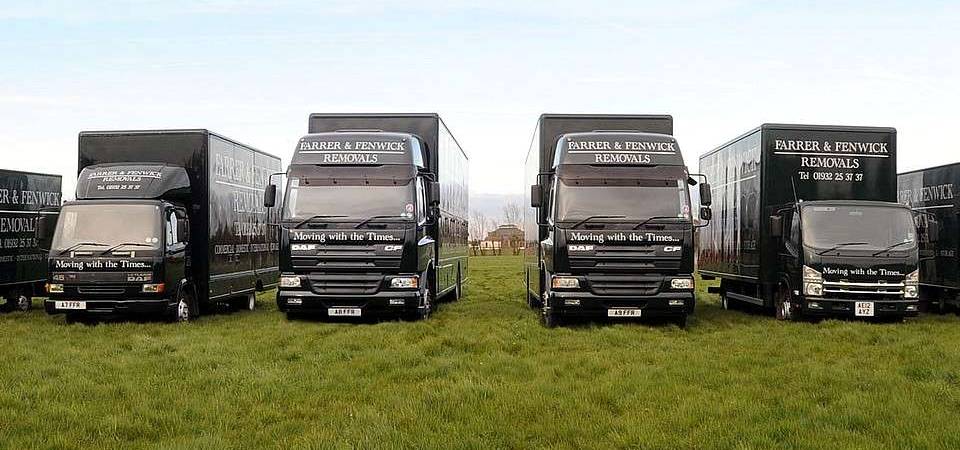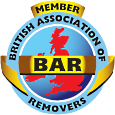As the introduction to Farrer and Fenwick's Surrey removals service shows, we do all we can to ensure your move is a stress free experience, before and on moving day.
There are still a few steps you can follow to make a move easier, see details below, or keep a pdf copy via the button:
One month before your move
- Confirm your removal date as far in advance as possible.
- Book the time you need off work.
- Prepare a list of fixtures you are leaving.
- Check your home insurance, make sure you have cover from the day you move to your new home.
- If you're renting, notify your landlord of your moving date.
Three weeks ahead
- Make a plan of your new home and decide which rooms will be used for what.
- Sort out the contents of your garage, loft and shed. Start getting rid of possessions you no longer need. Decide which items can go to a charity shop, be sold at car boot sale, or offered to friends.
- Organise suitable transport for your pets, or ask someone to look after them on moving day.
Two weeks ahead
- Make a list of everyone who should know about your move, Send them change of address cards.
- Start packing non essential items such as books and out of season clothing into boxes.
- Dismantle self-assembly furniture, unless we have agreed to do this for you.
- Arrange for professional disconnection of kitchen appliances, TV aerials, satellite dishes and light fittings.
- Arrange to have the gas, electricity, telephone and water meters read.
- Start running down freezers. Manufacturers advise against moving freezers in a full, or frozen state.
- Remove any fixtures and fittings you are taking.
- Cancel any services, e.g. window cleaner, milkman, newspaper delivery.
- Dismantle sheds, greenhouses, climbing frames etc, unless we have agreed to do this for you.
- Drain the fuel from lawnmowers/motor cycles.
- If appropriate, arrange for your children to be looked after on moving day.
- If you are moving in or out of a block of flats, arrange to have use of the manual override key or priority use of the lift.
- Deregister from your doctor, dentist & optician, if you're moving out of the area.
- Visit the post office and arrange for your post to be redirected.
The week before your move
- Finalise arrangements with us, confirm arrival times and make sure we have directions to your new address.
- Arrange a time to collect your new keys from the estate agent.
The day before your move
- Defrost the refrigerator and freezer.
- Prepare plants and shrubs for transit.
- Set aside an area marked "do not move" for coats, handbags, kettle, snacks, tools and cleaning materials.
- Arrange separate transportation for any dangerous substance.
Moving day
- Lock valuables somewhere safe and carry them personally to your new home.
- If your possessions are being stored, remember to retain important personal items, passport, driving licence, etc.
- Keep the kettle boiling.
- Before the removal van departs, check nothing is forgotten. Responsibility is yours to see nothing is moved in error.
- Ensure that our crew has directions to your new property and a phone number to contact you. Agree a time of arrival.
- Arrive at your new property, with the keys, ideally before the removal van.
- Label all rooms and direct the crew to position furniture and effects.
Complete Packing Guide
The best piece of advice we can give regarding packing is to begin as early as possible. Take the opportunity to have a good sort out, there is no point paying us to move items you no longer want.
We are happy to supply packing materials. When our surveyor visits he will assess how many boxes you require and once you accept our quote, we deliver them. If you have boxes you prefer to use, please make sure they are sturdy.
Packing a Box
- Choose the right box for the job, each supplied box is designed to carry certain items.
- Make sure you seal the bottom of the box with packing tape. Please DO NOT just fold the flaps of the box in a criss cross way. As soon as a box is picked up with any weight inside, the flaps unfold and everything falls out.
- Make a cushion in the bottom of the box with scrunched up packing paper.
- Wrap breakable items individually in paper or tissue, this will stop damage caused by them rubbing together.
- Pack your items in layers and stop the contents moving around by filling gaps with more scrunched paper.
- Check the weight of boxes as you go, they should always be manageable by one person. If they are becoming heavy while you pack, fill the rest of the box with light, bulky items such as towels, cushions or soft toys.
- Please make sure you pack your boxes so that when closed they are flat. Always fill the box to the top and close the lid, this strengthens the boxes and means they can be stacked on top of each other without crushing.
- Use a permanent marker to write which room you wish the box to end up in and a brief description of the contents. If you write on the tape, we know these are your instructions and the boxes are kept in better condition.
Materials We Can Supply
- Pack II (450mm x 450mm x 500mm) Multi-purpose box designed to carry most medium weight items in your home. We use these to pack the majority of your belongings including china, glassware, electrical items and clothes.
- Pack VI (457mm x 330mm x 330mm) These are our smallest boxes, designed to pack your heavier belongings. Please ensure items such as books, tools, tins and bottles are only packed into this size box. We can supply dividers for these boxes to make packing bottles easier.
- Wardrobe Cartons (508mm x 457mm x 1220mm) These enable hanging clothes to be moved without folding them into normal boxes. We bring them on removal day and take them out of your way at the end of the day.
- Paper and Tissue We will supply you with adequate paper and tissue to pack all fragile items when we deliver your boxes. Our packing paper is suitable for most items, whilst acid-free tissue is best for silver, pottery, or porcelain.
- Export Blankets These paper blankets are used to wrap furniture for export. They may also prove useful for your UK move, ideal for protecting pictures or mirrors.
- Special Requirements Should you have any unusual items needing protection, by all means contact us. Ensuring possessions arrive safely is a wish we share.
Essential Packing Points
- A good rule of thumb is that if it fits in a box put it in a box. This way there are fewer awkward bits lying around which make stacking a van, or container difficult.
- Most chests of drawers can stay full of clothes but you will need to take out heavy or breakable items. Self assembly furniture does not respond well to moving so this type of furniture can only be moved whilst completely empty.
- Plates and glasses should be wrapped in paper and stacked on their ends rather than flat, this way they are stronger and less likely to break. If you are packing glasses with narrow stems, try and pack out to the widest point for protection.
- Tall garden tools, brooms, mops and other such items should be bundled together with tape.
- Dismantle your lamps before packing, place the lamps in one box and shades in another, make sure you mark shade boxes so heavy boxes are not stacked on top of them.
- Fridges must be emptied before moving them, keep a cool box handy. If not too heavy, freezers can remain full if you are moving a short distance. Should they need to be on our van for any length of time, or come into storage, they must be thoroughly defrosted and dried out before moving day.
- Please DO NOT pack petrol, or flammable items, or gas canisters. Lawnmowers should be drained of fuel before going onto the removal van. If flammable items find there way onto the truck, this could invalidate your insurance cover.
- To avoid any frantic searching upon arrival at your new home, prepare an overnight bag ready for each member of the family, treat the situation as if you were all going to a hotel for the night.
- A well marked box or two containing essentials can also be welcome. Useful items might include the kettle (with tea, coffee and sugar), cutlery and crockery for one meal, a toolbox, mobile phone, laptop chargers, toilet roll, a first aid kit.
- We aim to reuse and recycle our materials as much as possible. Once your move is completed and you have finished unpacking, give us a call and we will arrange for collection of your used packing materials. Please empty the boxes, cut the tape, fold them flat and store in a dry place.
- If you can crush the paper into bin bags or a couple of larger boxes we will remove this as well. We are unable to collect boxes that have been ruined, either by being left outside to get wet, or during building and decorating work.
- That's the end. We hope you found our Removals Advice Pack useful, if you need further advice, please call us on 01932 253737.



